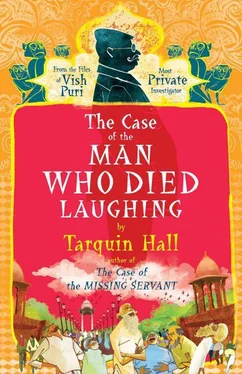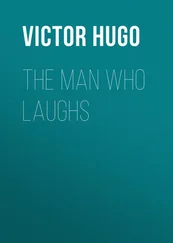Professor Pandey spent the next minute uttering embarrassing baby noises while swinging his arms around him like a windmill.
More exercises followed: Silent Laughter (which involved puffing out their cheeks, holding their fingers over their lips, wheezing like old bellows and pumping their shoulders up and down) and finally the Chicken.
“Ho ho, ha-ha-ha! Very good, very good, very good!”
At the conclusion of the session, which lasted thirty minutes, Professor Pandey invited anyone with a funny joke to share it with the rest of the group.
“Strictly no non-veg jokes, thank you very much!” he said. “Nothing you wouldn’t tell your nani-ji!”
“But, Pandey Sahib, my nani-ji is telling the dirtiest jokes of all!” cried out Mr. Karat, one of the other regulars, who could do an alarmingly realistic chicken impersonation.
This comment provoked more laughter – genuine, natural and wholly spontaneous laughter, that is. And then another regular, Mr. Gupta, announced that he had heard a cracker the night before.
“Manager asked a Sardar-ji at an interview: ‘Can you spell a word that has more than five letters in it?’ Sardar replies: ‘P-O-S-T-B-O-X’.”
Professor Pandey followed this up with a knock-knock joke.
“Knock, knock,” he said.
“Who’s there?”
“Bunty.”
“Bunty who?”
“Bunty,” repeated Pandey with a giggle.
“Bunty who?” the others said, prompting him again.
But the professor could not answer. Like Uncle Albert in Mary Poppins , laughter had got the better of him.
“Really, Professor Pandey, you must finish your joke. Otherwise what is the point?” said Mr. Karat, smiling. But then he, too, erupted into a fit of giggles.
Dr. Jha and Mr. Gupta followed suit, chortling like little girls.
This time, however, it was different; this time they were unable to stop.
“I… I… can’t control my… myself!” Professor Pandey declared through his laughter. “And I… I can’t move my feet!”
Dr. Jha said he felt rooted to the spot as well. To their alarm, Karat and Gupta felt the same. They all looked down at the ground, trying to ascertain what was holding them in place. As they did so, a mist started to form around their ankles. Soon, it blanketed the earth, lapping up around their shins.
Only Sharma was not affected by what was happening. But he dared not shift from his position. The stray dogs that had been lazing in the shade of the trees along Rajpath had started to surround the group of men, howling and barking. Dozens of crows were also circling overhead, cawing menacingly.
The sky seemed to darken. Thunder rumbled. There was a blinding flash. And then, in the middle of the group, a terrifying figure appeared.
Hideously ugly, with four writhing arms, a jet-black face and a large tongue slithering from her bloody mouth, she wore a garland of human skulls around her neck.
The men, still laughing but struck by sheer horror, recognized her instantly as the goddess Kali.
“Unbeliever!” boomed a screeching witch’s voice as the mist rose up around her.
The goddess pointed one of her long, wizened index fingers at Dr. Jha and rose up into the air, hovering several feet off the ground. In one hand, she wielded a bloodstained sword, in another a man’s severed head.
“I am Kali, consort of Shiva! I am the Redeemer! I am Death!”
A jet of fire shot from her mouth.
“You! Who have dared to insult me! You who have dared to mock my power! You will taste blood!”
The goddess glided through the air toward Dr. Jha, spewing more flames. The cawing of the crows and the howling of the dogs grew louder.
“Mere mortal! Now you are speechless!” she cackled.
Dr. Jha was now face-to-face with the goddess, still unable to move his feet thanks to some invisible force. He looked terrified and yet he was still laughing.
“Now die!” screeched Kali in a chorus of voices.
She raised her sword and drove it down into his chest. Blood flowed from the wound and spewed from his mouth. Clutching his chest, the Guru Buster uttered a last guffaw and then fell backward onto the grass, dead.
Puri’s day began without any indication that he would soon be investigating a ‘supernatural occurrence’ destined to capture the imagination of the entire nation – a case that he would later describe as ‘a first in the annals of crime’.
His Ambassador pulled into the car park behind Khan Market at ten o’clock. Handbrake was dispatched to replace the windscreen while the detective walked his usual route to his office.
Now the most expensive commercial real estate in all of India, Khan Market was home to new boutiques selling exorbitantly priced cushion covers and ‘size zero’ Indian couture. Trendy bars and restaurants had sprung up, the nocturnal playground for Delhi’s nouveaux riches. Where a greengrocer had once traded, trays of American-style mac-adamia chocolate chunk cookies were on offer at 80 rupees each, more than a day’s wage for most of the country’s working population.
But a number of the old family-owned businesses still thrived and the place remained scruffy and unkempt, retaining – in Puri’s eyes at least – a reassuring character lacking in the new sanitized shopping malls. Paint blistered and peeled from concrete walls, and spaghetti tangles of wires and cables hung overhead. Many of the shop signs leaned at angles. And the Punjabi princesses who flocked here with their proprietorial airs, high heels and oversize designer sunglasses had to negotiate cracked, uneven pavements cluttered with sleeping pye-dogs and hawkers.
“Kaise ho?” Puri called out to Mr. Saluja, who stood outside his tailor’s shop, overseeing one of his employees sprinkling water on the pavement to keep down the dust. The key wallah was also getting ready for the morning trade, laying out his medieval tools on a potato sack on a small patch of pavement: hammer, chisels, long metal files and a giant rusty key ring holding the uncut blanks he would use to make duplicates for his customers.
Mounting the steep, narrow steps that led up to the Most Private Investigators offices above Bahri Sons bookshop, Puri was greeted with a warm smile and a ‘Good morning, sir’ by Elizabeth Rani, whose desk took up a quarter of the small reception.
The first thing he did upon entering his office – that is, after turning on the air-conditioning – was to light an incense stick in the little puja shrine below the two frames hanging on the wall to the right of his desk. One contained a photograph of his father, Om Chander Puri, the other a likeness of Chanakya, the detective’s guide and guru who had lived around 300 BC and founded the arts of espionage and investigation. The detective said a short prayer, asking for guidance from them both, and then buzzed in his secretary.
Elizabeth Rani brought his post and messages and ran through a list of mundane matters that required his attention: “Kanwal Sibal’s wife birthed a son. You’ll visit them or I should send nuts and fruit?”
Door Stop, the tea boy, then brought Puri his morning cup of kahwa, Kashmiri tea steamed with saffron, cardamom, cinnamon, sugar and slivered almonds.
The detective savored the sweet liquid while bringing himself up to date with the cases on his books. Most Private Investigators was as busy as ever. So far this month, the agency had dealt with seven matrimonial investigations, which required background and character checks to be done on prospective brides and grooms having arranged marriages. An insurance company had hired the firm to ascertain whether a certain Mrs. Aastha Jain, seventy-four, had died of natural causes during the annual pilgrimage to Gangotri (the detective had found her alive and well, living it up in Goa under an assumed name). And Puri had brought to a speedy conclusion the unusual kidnapping of Mr. Satish Sinha’s father. Sinha Senior had been reincarnated as a monkey, and the detective had located him by following the local banana wallah’s best customer home.
Читать дальше












